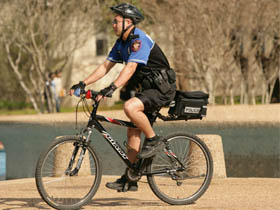Office of Internal Communications
|
March 2, 2006 NEW LOOK, SAME ATTITUDE FROM
The University of Houston Department of Public Safety’s (UHDPS) bicycle officers have a new look, but their attitude hasn’t changed when it comes to lending a hand to the campus community. “We’re here to help people whenever we can,” said officer Diego Tristan, one of the first members of the bicycle patrol. “We have new uniforms that give us higher visibility and identify us as police officers, so faculty, staff and students know that we’re here when they need us.” Although bicycle police have been patrolling campus since 2000, they just updated their uniform thanks to a suggestion from Malcolm Davis, UH executive director for public safety and police chief, who recommended a professional yet accessible look. The officers themselves made the final decision on a design and the result is a functional uniform that is ventilated and easy to spot with its police patches, sew-on badge and reflective trim for night patrols. Regardless of this visibility, bicycle officers can still circulate the campus and remain undetected by would-be criminals. Thanks to stealthy riding skills, they often apprehend suspects not expecting a police officer to be on a bike. “It’s easier to approach a suspect on a bicycle,” Tristan said. “An advantage that we have is that when someone flees into the nearby neighborhood, we’ll go looking for them. A suspect’s guard might be down because he’s expecting a patrol car instead of a bicycle, and that’s how we can surprise him.” UHDPS has 14 bicycle officers, who are divided among three shifts. Although the department provides bikes, many officers prefer to use their own. Bikes also are provided for parking enforcement officers. Houston Police Department trains the bicycle officers. Tristan, who has been a UH police officer since 1997, was among the first to undergo vigorous bike preparation, including riding downhill at full speed; then applying the brakes at the last minute; peddling uphill; riding down stairs; and balancing a bicycle without moving or peddling. In addition to knowing how to maneuver their bikes and ride for long periods of time, officers also have to contend with carrying between eight to 10 pounds of extra equipment, including their holsters, radios and protective vests. Such physical challenges are no problem for Tristan and his fellow officers. Riding bikes around campus for the past six years has increased their endurance. It also has allowed them to interact with the campus community. For Tristan, meeting with faculty, staff and students and listening to concerns is an everyday bonus as an officer. “People are more willing to engage a bike officer,” Tristan said. “I guess since we’re right there in front of them and not in a car, they are subconsciously more comfortable with approaching us. I like that. Many times, people will come up to us and ask questions or talk to us. It lets us know that they’re supporting us, and, most importantly, it gives us a chance to let them know that we’re here to help them.” Mike Emery |
|||
